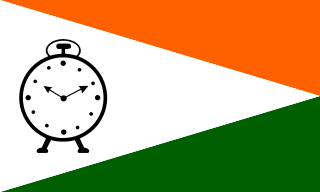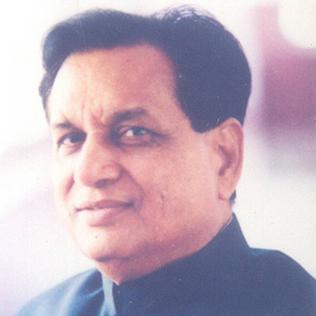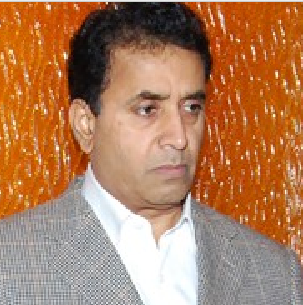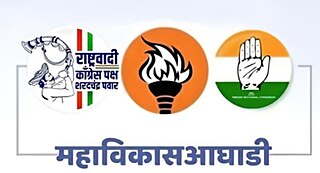
Sharadchandra Pawar is an Indian politician. He has served as the Chief Minister of Maharashtra for four terms and has also served in the Union Council Of Ministers as the Minister of Defence in the Cabinet of P.V Narsimha Rao and Minister of Agriculture in the Cabinet of Manmohan Singh. He is the first and former president of the Nationalist Congress Party (NCP), which he founded in 1999, after separating from the Indian National Congress. His NCP was split by his own nephew, Ajit Pawar. He leads the his faction NCP delegation in the Rajya Sabha, the upper chamber of the Indian parliament. He is the chairperson of Maha Vikas Aghadi, a regional Maharashtra-based political alliance.

The Nationalist Congress Party is one of the state parties in India. It refers to the Ajit Pawar faction after the 2023 split in the party when the Supreme Court of India granted the original party name and symbol to the Nationalist Congress Party. It was one of the major political parties in Maharashtra and was a recognised state party in Nagaland and Kerala. In July 2023, majority of the elected MLAs and MLCs of the party led by Ajit Pawar joined the National Democratic Alliance government, however, all MPs except two remained loyal to Sharad Pawar. This caused a direct split between the Ajit Pawar-led faction and the founder and president Sharad Pawar who formed the Nationalist Congress Party after EC recognised the Ajit Pawar faction as the original party.

Jayant Rajaram Patil is an Indian politician from the state of Maharashtra. He has been representing Islampur in the Maharashtra Legislative Assembly for more than 3 decades. He was the Cabinet Minister of the Water Resources Department in Uddhav Thackeray ministry. Previously he has been the Rural Development Minister, the Finance Minister and the Home Minister of Maharashtra.

Ajit Anantrao Pawar is an Indian politician who is currently serving, alongside Devendra Fadnavis, the Deputy Chief Minister of Maharashtra from 2 July, 2023. He served as the Leader of the Opposition in the Maharashtra Legislative Assembly from 2022 to 2023, and was a Member of the Parliament in the Lok Sabha in 1991, representing Baramati constituency. He has also been a member of the Maharashtra Legislative Assembly since 1991, representing Baramati constituency.

Govindrao Wamanrao Adik was an Indian politician. He was a member of the Nationalist Congress Party and served as a Member of Parliament in the Rajya Sabha. He began his political career as a Member of the Legislative Assembly (MLA) and He is brothers of Adv. Ramrao Adik 3rd Deputy Chief Minister of Maharashtra.

Ashok Shankarrao Chavan is an Indian politician from Maharashtra. He is son of ex-Maharashtra Chief Minister Shankarrao Chavan. He was one of the most influential leaders of Indian National Congress in Maharashtra but later resigned and joined Bhartiya Janata Party on 13 Feb 2024. He has served as the Chief Minister of Maharashtra state from 8 December 2008 to 9 November 2010. Also, he has served as Minister for Cultural Affairs, Industries, Mines and Protocol in the Vilasrao Deshmukh government and he is also the former PWD Minister of Maharashtra.
Maharashtra is India's third largest state by area and has over 112 million inhabitants. Its capital, Mumbai, has a population of approximately 18 million; Nagpur is Maharashtra's second, or winter, capital. Government in the state is organized on the parliamentary system. Power is devolved to large city councils, district councils, subdistrict (taluka) councils, and village parish councils. The numerically strong Maratha–Kunbi community dominates the state's politics. The state has national and regional parties serving different demographics, such as those based on religion, caste, and urban and rural residents.

Vijaysinh Shankarao Mohite-Patil is a politician from the Nationalist Congress Party and Member of Parliament (MP) for Madha in Maharashtra since the 2014 general election till the 2019 general election. He is member of Nationalist Congress Party.

Anil Vasantrao Deshmukh is an Indian politician from the state of Maharashtra. He is a senior leader of the Nationalist Congress Party. Deshmukh served as the Minister for Home Affairs in Government of Maharashtra between 2019 and 2021. Deshmukh resigned in 2021 as the Home Minister of Maharashtra due to allegations of extortion and laundering charges and is currently in judicial custody.
Although a parliamentary democracy, Indian politics has increasingly become dynastic, possibly due to the absence of a party organization, independent civil society associations that mobilize support for the party, and centralized financing of elections. Family members have also led the Congress party for most of the period since 1978 when Indira Gandhi floated the then Congress(I) faction of the party. It also is fairly common in many political parties in Maharashtra. The dynastic phenomenon is seen from national level down to district level and even village level.The three-tier structure of Panchayati Raj established in the 1960s also helped to create and consolidate the dynastic phenomenon in rural areas. Apart from government,political families also control cooperative institutions, mainly cooperative sugar factories,district cooperative banks in the state, and since the 1980s private for profit colleges. The ruling Bharatiya Janata Party also features several senior leaders who are dynasts. In Maharashtra, the NCP has particularly high level of dynasticism.

Devendra Fadnavis was sworn in as the chief minister of Maharashtra for the second time on 23 November 2019. Alongside Fadnavis, Ajit Pawar was sworn in as the deputy chief minister. Before a Supreme Court-ordered no confidence motion could take place, Pawar resigned on 26 November. Fadnavis resigned shortly thereafter, making his second ministry the shortest Maharashtra ministry, surpassing P. K. Sawant's 1963 interim government, that had lasted for nine days.

The Maha Vikas Aghadi or Maharashtra Vikas Aghadi, is a state-level political coalition formed after the 2019 Maharashtra Legislative Assembly election under the leadership of Uddhav Thackeray of SHS (UBT), Sharad Pawar of the NCP and Sonia Gandhi of the INC, along with the support from the Samajwadi Party, PWPI, CPI(M) and several other political parties including Independent MLAs. MVA is currently the official opposition in Maharashtra Legislature.

Prithviraj Chavan was sworn in as the Chief Minister of Maharashtra on November 11, 2010. The following is his cabinet. The government consisted of Chavan's Congress party and the Nationalist Congress Party.
Sudhakarrao Naik was sworn in as Chief Minister of Maharashtra on 25 June 1991, on resignation of his predecessor Sharad Pawar. The ministry served until February 1993, when Naik resigned due to his inability to handle the 1993 Bombay riots, and was replaced by Pawar.
After securing a majority in the 1990 Maharashtra legislative elections, the incumbent Chief Minister Sharad Pawar was re-appointed on 4 March 1990. Pawar formed his third ministry, consisting of 15 cabinet ministers and 6 ministers of state. The cabinet continued until June 1991, when Pawar was replaced by Sudhakarrao Naik.
On resignation of Shankarrao Chavan on 26 June 1988, Sharad Pawar was appointed Chief Minister of Maharashtra for the second time. Pawar formed his second ministry, which continued in office until legislative elections in 1990.
Shankarrao Chavan was sworn in as Chief Minister of Maharashtra for the second time in March 1986, on resignation of his predecessor, Shivajirao Patil Nilangekar. Chavan's cabinet served until his resignation on 26 June 1988, and subsequent replacement by Sharad Pawar's ministry.
In the aftermath of 1978 Maharashtra legislative elections, Vasantdada Patil of the Indian National Congress(U) was appointed Chief Minister. A coalition government, it consisted of members from Congress(Urs) and Congress (I), including Deputy Chief Minister Nashikrao Tirpude.
Shankarrao Chavan was appointed as Chief Minister of Maharashtra for the first time on 21 February 1975, replacing Vasantrao Naik. His first ministry lasted till 16 April 1977, and was succeeded by Vasantdada Patil's ministry.
Following 1972 Maharashtra Legislative Assembly election, incumbent chief minister Vasantrao Naik was re-appointed, and he formed his third government on 14 March 1972. This was to be Naik's last government which served until 20 February 1975.











